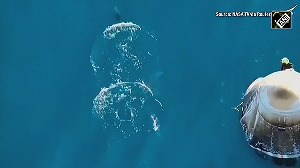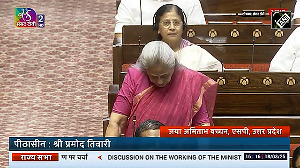On March 22 the Arab League mission in Delhi celebrated its 55th anniversary and a website, www.lasmindia.com, was launched .Visiting the website and going through the roots of establishing the League, what attracted me the most were the reasons listed for the urgency of launching a League inspired by the foreign minister of the United Kingdom, Anthony Eden, who encouraged the Arab States that gained independence to form a league of their own, in his speech on May 29, 1941 .
The objective was to create nationalism and let the Arabs feel more loyal to their geographical area rather than a pan-Arabism slogan, that inspired Egyptian, Syrian and Lebanese leaders to promptly work on the idea of establishing the League. Two years later, on February 24, 1943, the League came into existence after a meeting of the executive committee representing Syria, Egypt, Lebanon, Yemen, Jordan and Iraq. The representative of Palestinian parties attended the meeting as observers. The protocol was signed by all representatives present, except for Yemen and Saudi Arabia who signed it later.
The main objectives were so powerfully drafted to safeguard Arab interest, by rejecting the use of power to settle disputes between Arab States and being against the use of a foreign policy which harms the interest of the Arab League or any Arab State.
The protocol included a very important collective Arab stand on Palestine and considered it the core issue to protect Arab interest, since Palestine was mandated by the colonial British who secretly encouraged the establishment of a Jewish State at the cost of Palestinians and an influx of Jewish immigrants was pouring into Palestine. So the Arab League vowed to protect the right of Arab Palestinians and fulfill their legitimate rights.
It is a lengthy Arabic script about the beginning of the Arab League and the regional and international factors that led to it. The Arab leaders tried to create a balance in a turbulent world and worked on a joint defensive mechanism that failed miserably after the Iraq invasion of Kuwait and the post-war scenario which kept the US and its military arsenal in the heart of the Arab peninsula A working group was created to deal with crisis within the Arab States.
What the Arab League summits have achieved in the past is left to those interested in Arab affairs to debate. In many expert eyes the Arab League has failed on all accounts and what we see now is a house dived and an agenda that does not reflect the real issues that brought the League into existence .
On March 29 Baghdad hosted the Arab Summit against all odds with the symbolic participation of a few Arab countries amid divisions and clouds of the so-called 'Arab Spring' engulfing the Arab world and threatening its own existence. Many of the leaders would have kept the engine of their aircraft running fearing a terrorist attack on the green zone but to the Iraqis it was a victory that they are returning to the cuddle of the Arab family after a long US occupation . A message was sent to Teheran when a bomb blast was triggered close to the Iranian embassy, and unconfirmed reports mentioned a rocket fell in the green zone of Baghdad .
Syria was excluded but its current unrest strongly topped the agenda while the Bahrain unrest was not up for discussion because of pressure from Saudi Arabia and the GCC, the Palestine crisis was on the backburner despite the atrocities and violations of human rights by Israeli military forces against Palestinians which forced the UN human rights commission to investigate the illegal settlements by Israel in the occupied territories -- a move that prompted Tel Aviv to boycott the international organisation.
The Syrian president made a symbolic visit to Bab Amro in Homs city which was witness to hot pursuit by the army against arm groups supervised by Western security advisors, which took shelter in that quarter. The message was blatant: 'We foiled your attempt to destabilise Syria. Syria will remain a steadfast fortress against occupation and the Pan-Arabism pulsating heart of legitimate resistance'.
Damascus was quick to react and rejected any resolution on Syria since she was not present in the summit.
The US and the West admitted to their failure in their plot for a regime change in Syria and are now looking for a face-saving formula through Kofi Annan's mission and Moscow.
The outcome of the summit was sealed after the US and the West backed out from any military intervention in Syria and supported Annan's mission. The resolution on Syria echoed the same over Syria with a sermon on human right violations, accusing Damascus of human rights violations, ignoring the atrocities committed by insurgents and extremist armed groups funded and supported from outside .
The outcome disappointed the Arab masses and the only moral victory was for a wounded Iraq. Many in the Arab world believe that many of those leaders present in Baghdad do not represent them and the wave of changes will hit their shore sooner than expected. We may thus have to wait for more summits to see true Arab leaders emerging, who can charm the masses and lead from the front. For the time being the outcome will be considered an April Fool joke.
For Syria, which is Arabic for Surya the Sun, it will be a big task to restore law and order and rebuild a nation that was badly hurt through foreign interferences and mercenaries carrying passports to heaven. The Syrians have to stop the bloodshed by all means and collectively build a strong Syria that may not find many friends among the new Arab leaders but definitely have a strong Arab mass support for its stand on many issues regarding the Arab cause. As we say in Arabic: The sieve cannot shield the Sun (Surya).
Dr Waiel Awwad is a senior Arab journalist based in South Asia










 © 2025
© 2025